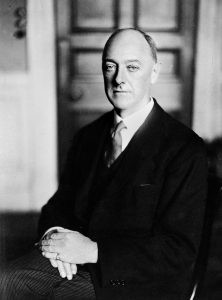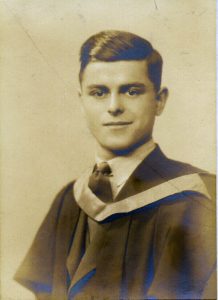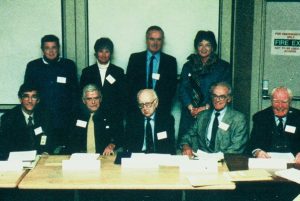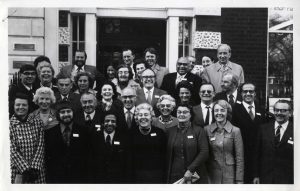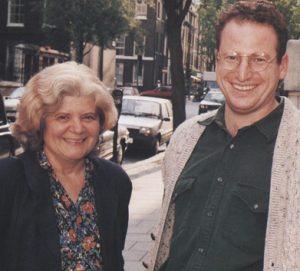Sir William Wilson Jameson:
Described by Sir Philip Manson-Bahr as, ‘the most distinguished Dean of the London School of Hygiene & Tropical Medicine’, and a great teacher, who successfully led the School after the tragic death of Sir Andrew Balfour, Jameson was both a respected teacher of public health and guiding force in health policy.
After nine years serving the School, Jameson was appointed Chief Medical Officer in 1940. During his appointment, Jameson gained the reputation for tackling taboo subjects, such as venereal diseases, speaking candidly on national broadcasts. Nevertheless he is probably best known for his role in the development of the NHS. From 1942 to 1944, Jameson developed the hospital surveys that would form the basis of the National Health Service. Jameson was also fundamental in bridging the gap between the government and the medical profession, where he was often used to gauge the latter’s reaction to draft proposals, and he ensured that medical professionals were salaried within the NHS. Jameson’s successful relationship with Aneurin Bevan, Minister of Health, ensured that the plans of the NHS progressed with the support of the medical profession.
Jameson retired in 1950, but continued working in health policy working as a medical adviser at the King Edward VII Hospital Fund for London. He passed away in 1962 at the age of 77.
Sir William Wilson Jameson’s papers, which document his appointment as Professor of Public Health at LSHTM, are available in the archives.
Professor Jerry Morris, CBE:
Jerry Morris is often described as the man who ‘invented exercise’ after discovering the role exercise plays in cardiovascular disease, in 1949, when he compared the health of bus drivers and conductors, however he was also an advocate for social reform in public health.
During the 1960s, Morris, along with Richard Titmus and Brian Abel Smith, helped develop the health policy of the Labour government. It was his involvement in the Seebohm committee and Hunter committee that led Morris to propose the new community physician who would be responsible for community diagnosis, it was intended to be at the foundation of the NHS. This work led to the creation of the MSc in Community Medicine at LSHTM.
In 1980, Morris was part of the Black committee that would later produce the Black Report. It was commissioned by David Ennals, Secretary of State at the time, to establish what caused the inequalities in health since the formation of the NHS. However, the report was not published until 1980, when the Conservatives came to power. Patrick Jenkin, Secretary of State for the Environment wrote the foreword making it clear that he did not agree with the findings that concluded that social factors such as income, housing, education and diet were the cause of inequalities that effected infant mortality rates and life expectancy. The recommendation of the implementation of a social policy to improve social inequalities was rejected. Sir Donald Acheson, former Chief Medical Officer and LSHTM lecturer, would come to the same conclusion in his ‘Independent Inquiry into Inequalities in Health Report’, otherwise known as the Acheson Report in 1998, unlike the Black Report, its findings were reflected in UK health policy up until 2011.
Jerry Morris was an integral member of LSHTM until his death in 2009 at the age of 99.
Jerry Morris’ papers are currently being catalogued and will soon be available to view in the archives.
Dr Jennifer Roberts
Jenny Roberts was a pioneer of Health Economics, becoming the first Health Economist at the School. Throughout her forty year career, Jenny’s research was closely linked with NHS changes and reforms, beginning with the 1974 large-scale administrative reorganisation of the NHS in England which placed all health services into regional and area health authorities.
To prepare for the reform, in 1972 the Centre for Extension Training in Community Medicine (CETCM) was created at 31 Bedford Square, in order to retrain NHS staff. It especially focussed on retraining doctors who were in medical admin moving to new roles in ‘integrated Health Service’. The Centre was funded by the DHSS (Dept.. of Health & Social Security) with Dr Roy Acheson its first Director. Jenny joined in 1973, as Senior Tutor in Health Economics. The Centre was amalgamated with the School’s Department of Community Health in 1976.
In the 1980s, Jenny researched the market-based NHS reforms, in particular looking at the links between the use of contracted-out NHS services, and the increase in Hospital Acquired Infections. She was a passionate teacher, and introduced the Health Policy, Planning and Finance MSc to the School.
Jennifer Roberts’ papers will be available to researchers later this year.
Edit: It was stated that David Ennals rejected the findings of the Black Report, however the report was only published in 1980 under the Conservative party. This has been rectified.







